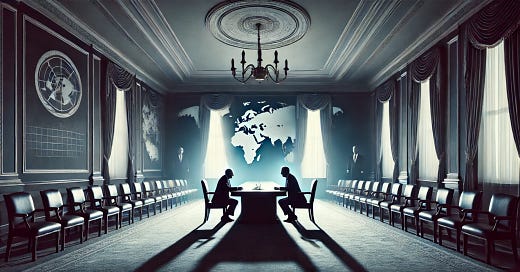Rubio-Cho meeting highlights the illusion of shared interests
Until Donald Trump turns his attention to the Korean Peninsula, the future remains in limbo, waiting for real power (and ego) to shape its fate.
The 15 February meeting between U.S. Secretary of State Marco Rubio and South Korean Foreign Minister Cho Tae-yul was little more than a diplomatic ritual devoid of substance. Although dressed up as a high-level reaffirmation of U.S.-South Korea ties, the meeting delivered nothing new. It could have taken place during the waning days of the Biden administration, with the same talking points, the same empty reassurances, and the same lack of outcomes.
Despite attempts to project strength and unity, the meeting revealed more about the current vacuum in South Korean leadership and unpredictability in U.S. leadership than it did about the alliance itself. With no decisive leader at the helm, South Korea is incapable of crafting long-term foreign policy or responding forthrightly to growing concerns.
Every gesture toward a grand strategy is undermined by South Korea’s fractured political environment, leaving its fate at the mercy of external forces. Seoul remains in a holding pattern, unable to act or adequately prepare for the next move by Donald Trump, the only person whose decisions will truly matter for U.S.-ROK relations. In this context, the Rubio-Cho exchange feels like little more than window dressing.
Media coverage of the meeting predictably emphasized the supposed strength of the U.S.-South Korea partnership. Mainstream outlets were quick to celebrate the reaffirmation of ties and the vague commitments to the "complete denuclearization" of North Korea - a statement about as meaningful as a 3am butt-hurt Trump tweet after a nasty CNN report.
Missing from the headlines was any acknowledgment of the deeper reality: that neither Rubio nor Cho wields any real influence. Both figures played their roles, but neither has the power to shape the future. Rubio is a disposable tool, who can neither influence nor disobey Trump, and Cho is a placeholder in a rudderless government without a coherent direction. While they are both incredibly talented individuals (it’d probably be better if they were the leaders), cicumstances have made them puppets.
The broader implications are stark. With no real outcomes from the meeting and no leadership in South Korea, the country is essentially in a strategic limbo. Rubio’s presence may give the illusion of diplomacy, but without strong and predictable leadership in Seoul and Washington, the U.S.-ROK alliance is a ship without a captain, adrift and waiting for external forces to dictate its course. The non-meeting between Rubio and Cho merely confirmed that reality.
The Rubio-Cho meeting was a symbolic gesture, devoid of substance, with no real outcomes or decisions. Until Donald Trump turns his attention to the Korean Peninsula, the future remains in limbo, waiting for real power (and ego) to shape its fate.




